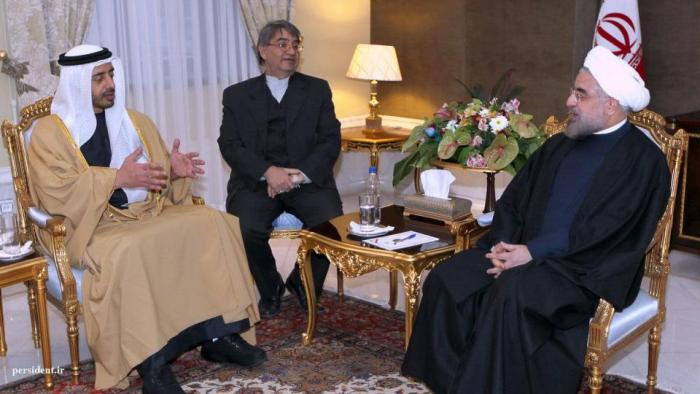It Is Time for UAE to Reorient Ties with Iran

(Hassan Rouhani talks to UAE Foreign Minister during his visit to Tehran in December 2013. Source: Rouhani.ir)
Iran and the UAE have long been economic partners but political rivals. One may say this still applies after the nuclear deal, but the UAE is playing with fire.
Last week, Foreign Minister of the United Arab Emirates expressed concern over Iran’s actions that caused “tension and instability in the region,” speaking to the recent United Nations General Assembly in New York.
“Regional interference in Arab affairs, mainly perpetrated by Iran, the only country in the world with a constitution that explicitly calls for exporting its revolution, has aggravated conflicts in the region,” Minister Sheikh Abdullah Bin Zayed Al Nahyan said.
He cited what he saw as Iran’s expansionist regional policies, flagrant violations of the principles of sovereignty and constant interference in the international affairs of its neighboring countries, Asharq al-Awsat reported.
Elsewhere in his remarks, he added what could be considered UAE’s view of the post-deal Iran. “Against all optimistic expectations, Iran wasted no time in continuing its efforts to undermine the security of the region, through aggressive rhetoric, blatant interference, producing and arming militias, developing its ballistic missile program, in addition to its alarming designation as a state sponsor of terrorism.”
It is easy to see where such hostile stances come from. When the Saudi Arabia broke ties with Iran in January over the storming of its embassy in Tehran during a furious protest at Riyadh’s execution of prominent Shia cleric Sheikh Nimr al-Nimr, Emiratis were among the first Arab countries to follow suit by downgrading Tehran ties. Soon after, Sheikh Abdullah Bin Zayed Al Nahyan got himself personally involved in the face-off between Iran and Saudi Arabia, by answering back Iran’s MFA Javad Zarif on Twitter.
When Zarif published an editorial in the New York Times titled “Saudi Arabia’s Reckless Extremism”, deploring the kingdom’s human rights record and accusing Riyadh of supporting extremism and “sectarian hatred”, Sheikh Abdullah responded in a tweet saying, he thought the author was the foreign minister of a Scandinavian country. Zarif shot back, tweeting “Diplomacy is the domain of the mature; not arrogant nouveau-riche,” without directly mentioning UAE.
The post-nuclear deal Emirati officials are trying to picture is reflected in the article Emirati ambassador to the US Yousef al-Otaiba published in the WSJ on the occasion of the nuclear deal’s first anniversary.
UAE officially backed the prospects of a nuclear deal between Iran and world powers and even used the breakthrough agreement to signal its entry into the world’s nuclear club. However, Iranian experts found UAE as a pressure leverage used by the US on Iran, particularly when the Arab state started to expel Iranians back in 2013.
Commercially, the UAE has a lot to gain from the post-deal Iran. Almost half a million Iranians in possession of more than $300 b live in the Emirates. Dubai has been a trade hub for Iran before and during the oppressive sanctions. It is an acknowledged fact that the growth of Dubai’s Jebel Ali port in the 1980s was tightly linked to the Iran-Iraq war and the rise in costs of shipping and insurance in the northern Gulf.
However, Abu Dhabi has gone too far in spoiling its chances for political differences. Its decision to expel some Iranians during the second term of the Ahmadinejad administration, failure to allow Iran-Oman’s joint undersea gas pipeline from its waters, imprisonment and insecurity of thousands of Iranian nationals who annually travel to Dubai, its repetitive claims to the three islands and accusations of interference and support for terrorism against Iran has sown distrust in Tehran.
Worse, its complicity with Saudi Arabia and other oil-rich Arab states to increase oil production and reduce prices has backfired in the form of economic problems. In fact, what Tom Klein anticipated as early as July 2015 is already happening to UAE. A stronger Iran in proxy wars in Syria, Yemen, and Bahrain, slimmer chances of a defense pact with the US and NATO, biting budget deficit caused by insistence in dumping Iran out of oil market, which could spark domestic discontent.
With the aggressive oil plot gradually foiled in less than nine months since the implementation of the nuclear deal, Iran is serene in its response because it senses that it is almost time the UAE reconsidered mutual ties. Even though Iran is unwilling to take verbal confrontations any further because it finds its interests in soothing regional tensions through what it calls strategic patience, more radical voices are making themselves heard in Tehran. Former MP Mansour Haghighatpour, member of the hardliner Paydari Front, has warned “backward” Arab states, in an interview with Mizan, of Iran’s response. “Emirates is occupying two Iranian islands, named Ariana and Zarkouh. That we are exercising patience and say nothing does not mean they could act with impudence,” the former deputy chief of Iran’s parliamentary national security committee added.

